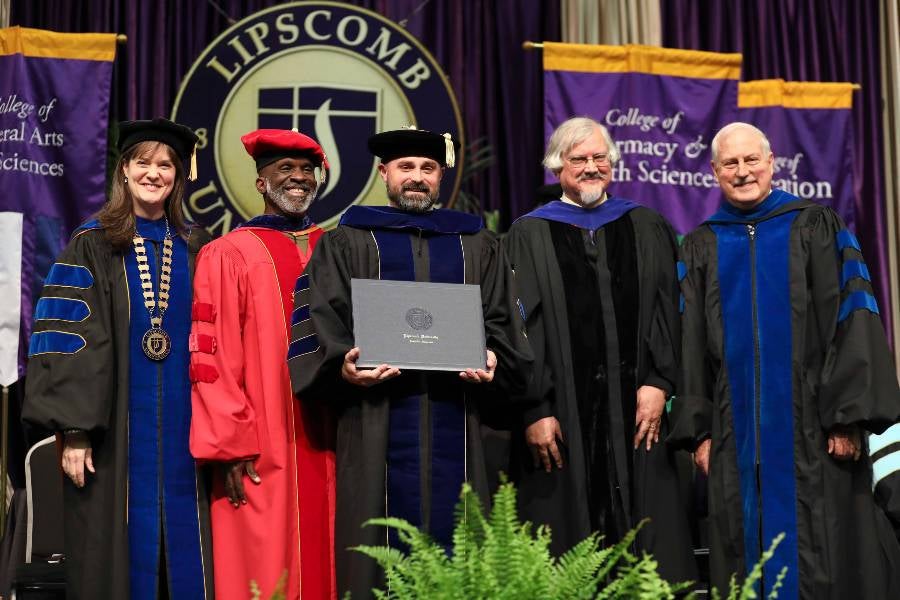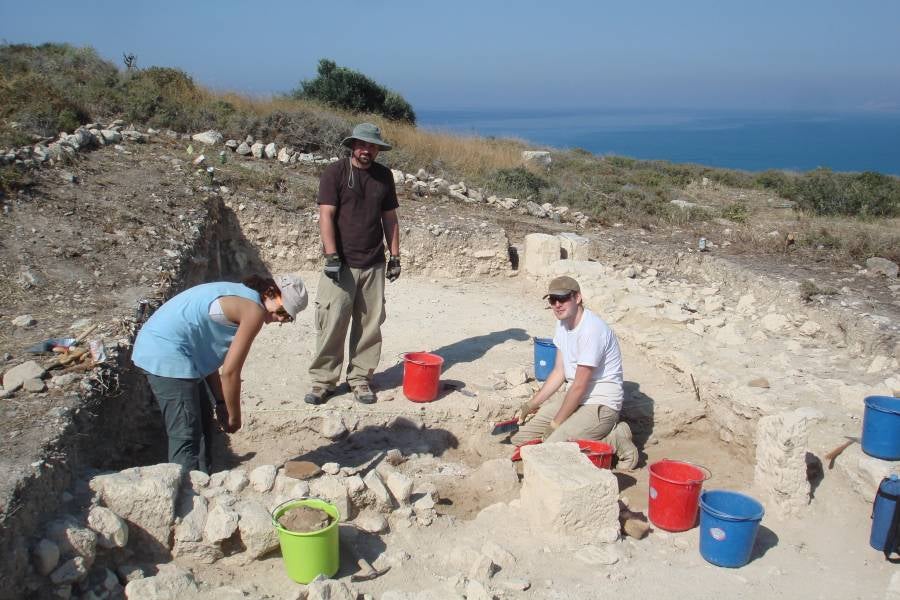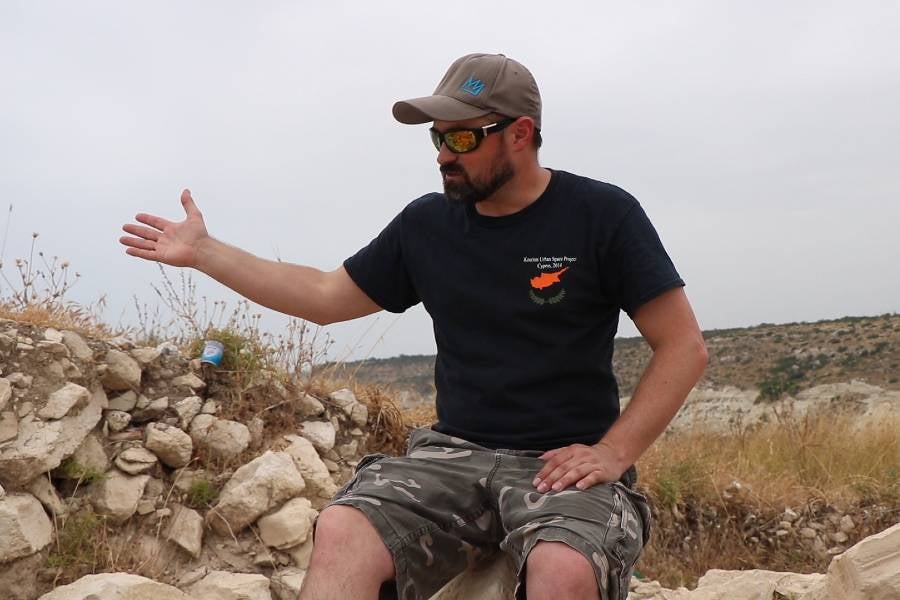Graduate Spotlight: Grimsley makes history as Lipscomb’s first Ph.D graduate
Kim Chaudoin |

President Candice McQueen; David Holmes, College of Liberal Arts & Sciences dean; Lucas Grimsley; Tom Davis, associate director of Lipscomb’s Lanier Center for Archaeology; and Provost W. Craig Bledsoe, celebrate the historic moment at commencement May 7.
Exploring ancient history is a passion for southern California native Lucas Grimsley. On Saturday, Grimsley himself made history as Lipscomb University’s first Doctor of Philosophy graduate.
Not only is he the first to receive a Ph.D. from Lipscomb, he is also the first to receive it in the institution’s newest doctoral program — archaeology.
With an undergraduate degree in Biblical Studies and Christian Ministries from Azusa Pacific University and master’s degrees in theology and in archaeology and biblical studies from Southwestern Baptist Theological Seminary, Grimsley began his quest to earn a doctoral degree more than a decade ago. Following his love of archaeology, Grimsley has devoted much of that time not only to his studies and writing his dissertation but also to work in the field.
He says that biblical history came alive for him the first time he participated in an archaeological project while working on his master’s degree in theology. Since then he has worked on projects in Israel, Central Asia and, for the past 10 years, as a member of an archeological field team at an excavation site on the Mediterranean island of Cyprus. The Kourion Urban Space Project (KUSP) is a multinational effort seeking to better understand the transitional period of the 4th century AD when Christianity replaced the traditional Roman religion, paganism, as the dominant religion of the island. Dr. Tom Davis, associate director of Lipscomb’s Lanier Center for Archaeology, is the principal investigator on the project and today, Lucas serves as field director.
The archaeological evidence found in the KUSP and its accurate interpretation is crucial for reconstructing this period. The project is also examining the impact of earthquakes in the ancient world and the cultural response to it. Kourion is located at Episkopi Bay, on the southwest coast of Cyprus. While it has settlements from the Neolithic to the Medieval periods, the emphasis of the excavation project is on the later Roman and Early Byzantine Periods, the world of the New Testament and the Early Church.

Site work for Kourion Urban Space Project
“In the early 4th century AD Kourion was a vibrant Greco-Roman city containing a civic center, bathhouse, theater, stadium and a large pagan religious complex dedicated to the deity Apollo Hylates but had no public church buildings,” explains Grimsley. “By the mid-4th century AD this site along with others on Cyprus were rocked by a series of earthquakes that destroyed many of the urban sites and their buildings. Included in this destruction was the pagan temple of Apollo. During the rebuilding of Kourion the inhabitants did not repair or rebuild Apollo’s temple, instead they began to build churches.”
Grimsley says many of the domestic structures at Kourion destroyed in the earthquakes were left untouched, “providing archaeologists a window to this moment in time.”
“When we began our work we were interested in how that played out in the everyday life of common individuals. So when we started, that was our goal. What ended up happening is we actually found an upper class home. It wasn’t actually what we were originally looking for, which is not uncommon in archaeology,” explains Grimsley. “So we had to adjust some of what we were doing to accommodate what we actually found. We're still looking at what's happening in homes and in the lives of people. But we're also now looking at it through not just the lower class, or the common average person, but just people in general.”
Grimsley says in addition to examining this through how it affected people, they are also working to understand earthquakes in the ancient world and the impact on the physical structures. One aspect of this project is excavating a well-preserved structure, a large two-story upper-class home that collapsed in on itself preserving many of the artifacts of the home as a result of the earthquake. Within this building Grimsley says the excavation uncovered numerous coins, a glass plate imported from Egypt, sculpture fragments, painted plaster and mosaic floors among other findings. In addition, the skeletal remains of four individuals who were trapped and crushed by falling boulders from the earthquakes were found huddled together in one of the rooms. Currently, Grimsley is part of a team planning ways to implement the field methodology, how to excavate and how to collect material.
There are many reasons Grimsley says he enjoys archaeology. “I personally enjoy the work. It's a physical job and I’m often outdoors. I love that part of it,” he explains. “But it is also an intellectual job because it requires us to think through and analyze, and essentially piece together the remains and the material culture that we find to understand the past.”
Archaeology is important to us all because understanding our past helps us understand our present. — Lucas Grimsley
“We want to make sense of these things,” continues Grimsley. “It's like a puzzle, because we don't always have all the pieces or if we do we don't know the order that they all fit in. So it's fun to think through how those things connect and what their relationship is and to determine what we may be missing. The combination of the physical side and the intellectual side combines two things that I really enjoy.”
Archaeology is also important for everyone, Grimsley firmly believes.
“Archaeology is important to us all because understanding our past helps us understand our present,” he says. “It also helps us understand human behavior … why we do what we do now or why we don’t do things that we used to. It is also important in preserving a culture’s heritage for others to see, enjoy and learn from.”
It is even more significant to Christians. “For Christians, I think there's another layer here. We also want to understand our Christian heritage. As Christians we believe our faith is grounded in real historical real events,” says Grimsley. “I think it's important for us to understand the context in which these events took place. Doing so helps us to ground our faith historically and helps us connect with scripture. It helps us understand the history behind Christianity and how God works through the world.”

In 2013, Grimsley enrolled in the Ph.D. program in archaeology at the Tandy Institute at Southwestern that is today housed in Lipscomb’s Lanier Center for Biblical Archaeology. For the last three years, Lucas has been working on his dissertation, "Identity and Urban Development- The Influence of Christianity on City Planning in Cyprus During the 4th-6th Centuries AD."
Completing his Ph.D. is “very satisfying,” says Grimsley.
“There is a weight that feels like it has been lifted,” he admits. “As graduation approaches it is becoming more real that I’m actually done. It's definitely an exciting thing. My wife is excited. My kids are excited and my family is really excited. I'm really glad that this hard part of my education is over and I can start looking to use my education now in the field that I have spent so much time preparing for.”
Grimsley says a number of people have encouraged him along his journey.
“ I'd have to say that the biggest supporter and encourager for me has been my wife, Aurora. There is no way I could have done this if she was not behind me,” he reflects. “Additionally, having a support network of peers who are going through the program has been a big help. Tom Davis has encouraged me to look into certain areas and pursue things that I've been interested in. He's given me a lot of opportunities within the field of archaeology that I normally would not have had.”